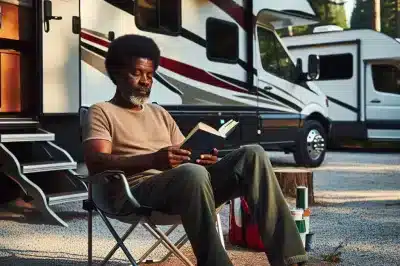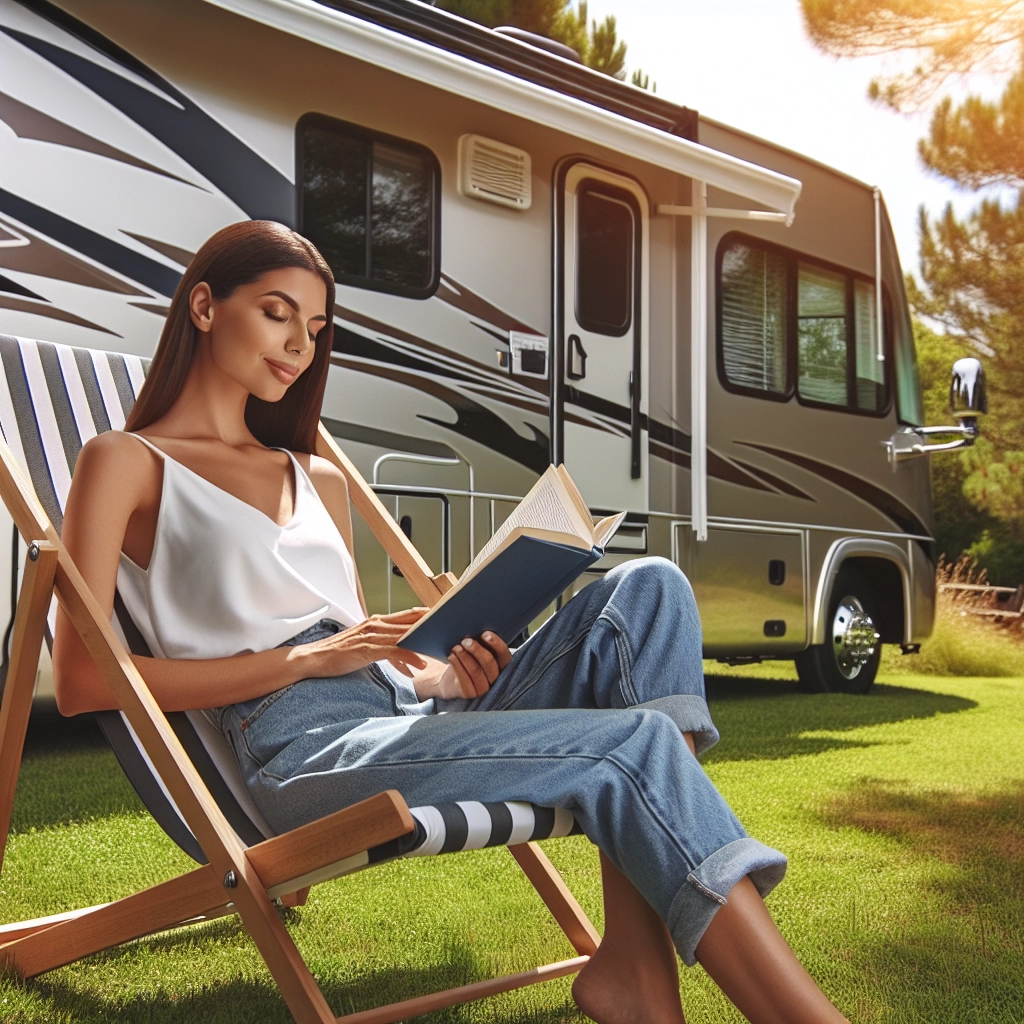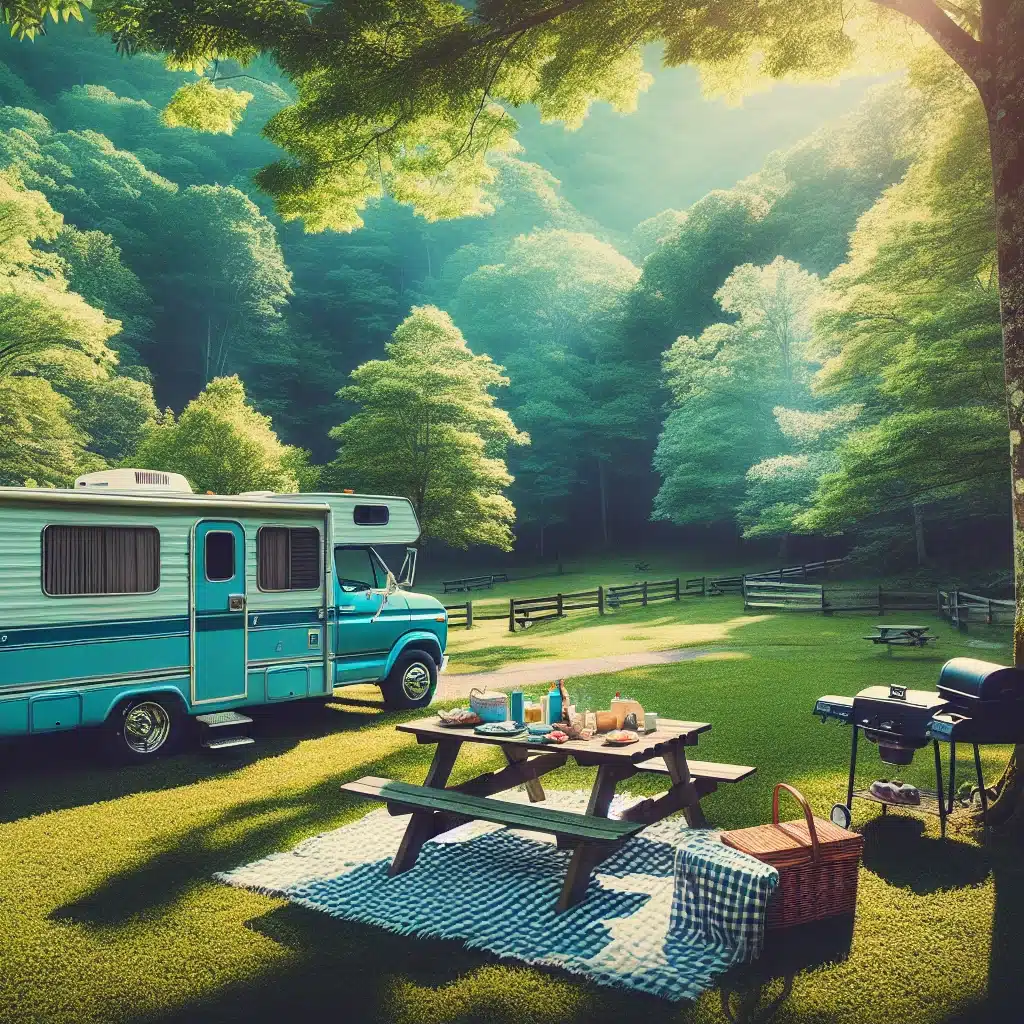Table of Contents

Boondocking RV Solar Power: Keep Charged with Solar Panels
Key Takeaways: Harnessing the Sun for Your RV Adventures
- Discover why solar power is essential for off-grid RV living.
- Learn how to calculate the solar power needs for your RV.
- Understand the types of appliances and energy usage for efficient solar planning.
- Get tips on choosing the right solar panels and equipment for your lifestyle.
- Find out how to adapt your solar setup to keep you powered wherever you roam.
Why Solar is a Game-Changer for Off-Grid RVing
Imagine waking up to the gentle sound of nature, your RV nestled in a picturesque, remote location. This is the boondocking dream, and solar power is your ticket to making it a reality. Solar panels provide a reliable and sustainable energy source, allowing you to enjoy the comforts of home without the need for noisy generators or the constraints of hookups. It’s about freedom, sustainability, and independence. With the sun as your fuel, the horizon is truly your only limit.
Understanding Boondocking Necessities
Boondocking, or dry camping, means setting up camp without hookups to water, power, or sewer. It’s all about self-sufficiency. To thrive off-grid, you need to know your energy needs. Lighting, refrigeration, and charging devices are just the start. Your RV’s power system must be up to the task, and that’s where solar power shines. It’s clean, quiet, and, once set up, a cost-effective solution to power your RV lifestyle.
The Freedom of Solar: Beyond the Campground
With solar panels on your RV, you’re no longer tethered to designated campgrounds. You can explore more secluded spots while still enjoying modern conveniences. Solar power gives you the ability to stay connected and comfortable, whether you’re working remotely or just want to kick back after a day of adventure. It’s not just about the energy; it’s about the empowerment and peace that comes with a self-sustained life on the road.
Calculating Your RV’s Solar Power Needs
To start your solar journey, you’ll need to figure out how much power you use. This isn’t guesswork; it’s about understanding your habits and needs. Start by listing all your electrical devices and how long you use them each day. This will help you calculate the total watt-hours you consume, which is crucial for determining the size of your solar system. Remember, it’s better to overestimate your needs a bit to ensure you don’t fall short on power.
Gauging Appliance and Usage Energy Requirements
Every appliance in your RV has a power rating, usually listed in watts. Add up the wattage of everything you plan to use, from lights to laptops, and consider how many hours a day you’ll use each item. For example, a fridge might run continuously, while a microwave is used just a few minutes at a time. This information will give you a daily watt-hour total, which is a key figure in planning your solar setup.
Adapting Solar Inputs to Match Your Lifestyle
Your solar power needs are as unique as your RVing lifestyle. Do you work on the road, requiring constant power for computers and cameras? Or are you a nature lover who needs minimal electricity? By tailoring your solar system to your specific habits and preferences, you ensure that you have the power you need without carrying excess weight or spending more than necessary. It’s all about finding that sweet spot where your energy needs meet the efficiency of solar power.

Selecting Your Solar Panels and Equipment
Choosing the right solar panels and equipment is crucial for a successful off-grid RV experience. You’ll want to consider factors such as power output, size, durability, and cost. The goal is to get the best return on your investment with a system that will last for years, through all your travels and adventures. It’s not just about buying solar panels; it’s about building a system that will reliably meet your energy needs.
Types of Solar Panels: Portable vs. Fixed
When it comes to solar panels for your RV, you have two main options: portable and fixed. Portable panels can be moved to capture sunlight better and are great for those who park in the shade or only need solar occasionally. Fixed panels, on the other hand, are mounted on your RV’s roof and provide a constant charge while driving or parked. Your choice will depend on your travel habits, parking preferences, and how much solar power you need on a daily basis.
Important Features: Efficiency, Durability, and Size
Efficiency is key when space on your RV’s roof is limited. Look for panels with a high conversion rate, meaning they turn more sunlight into electricity. Durability is also important; your panels should withstand harsh weather and the rigors of the road. And size matters, both in terms of wattage and physical dimensions. You’ll need to balance your RV’s roof space with the amount of power you want to generate.
Essential Accessories: Charge Controllers and Inverters
A solar panel system is more than just panels; you’ll also need a charge controller to protect your batteries from overcharging and an inverter to convert DC electricity into AC for your appliances. A good charge controller will extend the life of your batteries, and a pure sine wave inverter will ensure that sensitive electronics run smoothly. These components are vital for a safe and efficient solar power system.
Installation and Optimization Tips
Proper installation and optimization of your solar panels can significantly impact their performance. Take the time to install your system correctly, and you’ll reap the benefits of efficient, reliable power. This might mean learning some new skills or hiring a professional, but either way, it’s an investment in your off-grid future.
Positioning Panels for Maximum Sun Exposure
To get the most out of your solar panels, position them where they will receive maximum sun exposure. This usually means installing them on the roof of your RV at an angle that captures the most sunlight throughout the day. If you have portable panels, you can adjust their position as the sun moves across the sky to soak up even more rays.
Daily and Seasonal Adjusting for Optimal Performance
Your solar panels’ efficiency can vary with the seasons. In the summer, when the sun is high in the sky, you might not need to adjust them as much. But in the winter, when the sun is lower on the horizon, tilting your panels can capture more sunlight and generate more power. Regular adjustments, based on the time of year and your location, can significantly boost your solar system’s performance.

Energy Storage Solutions for Nighttime and Cloudy Days
Even the best solar panels won’t help you much after the sun goes down or during overcast days. That’s where energy storage comes in. A robust battery bank will store the energy your panels generate during the day, so you can use it at night or when the sun isn’t shining. Choosing the right batteries and maintaining them properly will ensure that you always have power when you need it.
Choosing the Right Batteries
When it comes to storing the power your solar panels generate, not all batteries are created equal. You’ll want to choose batteries that match your energy needs and travel lifestyle. Deep-cycle batteries are the go-to for RV solar systems because they’re designed for the long haul, allowing you to draw power over extended periods. There are several types, including lead-acid, AGM, and lithium-ion, each with its pros and cons. Lithium-ion batteries, while pricier, are lighter, last longer, and offer more usable energy, making them a smart choice for serious boondockers.
Maintaining and Monitoring Battery Health
A well-maintained battery bank is the heart of your solar power system. Regular checks for corrosion, proper fluid levels, and ensuring connections are tight and clean will go a long way. Monitoring systems can help keep an eye on your battery’s state of charge, so you’ll know exactly when it’s time to recharge, preventing damage from over-discharging. Remember, healthy batteries mean consistent power, so treat them well, and they’ll do the same for you.
Integrating Solar Into Your RV’s Existing Electrical System
Integrating a solar system into your RV isn’t just about slapping on some panels and calling it a day. It’s about creating a seamless connection between the solar power you generate and the existing electrical system in your RV. This integration ensures that all your onboard gadgets and appliances can draw from your solar batteries as needed. It’s a harmonious blend of old and new, giving you the best of both worlds.
Safeguarding with Proper Wiring and Overload Protection
Wiring your solar system correctly is critical to safety and efficiency. The right gauge of wire, fuses, and circuit breakers will protect your system from overloads, which can cause damage or even fires. Overload protection is like a safety net for your RV’s electrical system, ensuring that everything runs smoothly and your adventures stay carefree.
Converting DC to AC: The Role of a Power Inverter
Your RV’s appliances likely run on alternating current (AC), but solar panels and batteries deal in direct current (DC). That’s where a power inverter comes into play, transforming DC into appliance-friendly AC. A quality inverter will ensure that this conversion is efficient and safe, providing you with reliable power for everything from your microwave to your TV.
Living with Solar Power on the Road
Embracing solar power is more than just a technical setup; it’s a lifestyle. Living with solar on the road means being mindful of your energy consumption and adapting to the rhythms of nature. It’s a shift towards sustainability and self-reliance that can be incredibly rewarding.
Adopting Energy-Saving Habits
Energy-saving habits are key to maximizing your solar power system. Simple changes like switching to LED lighting, using natural ventilation instead of air conditioning, and unplugging devices when they’re not in use can significantly reduce your energy consumption. These habits not only extend the life of your batteries but also mean you can go longer between charges, giving you more freedom to explore off the beaten path.
Managing Expectations: Realities of Solar Power Usage
Solar power is a fantastic resource for RVers, but it’s not limitless. Understanding the realities of solar power usage will help you manage expectations and plan accordingly. Sunlight availability, weather conditions, and your energy habits all play a role in how much power you’ll have. By managing expectations and planning for these variables, you can ensure that your solar-powered RV adventure is both enjoyable and sustainable.
Real-world Insights: Boondockers Who’ve Made the Switch
Success Stories and Lessons Learned
Meet Sarah and Jake, a couple who left city life to explore the country in their solar-powered RV. They’ve been boondocking full-time for two years and share that the best part is the freedom to park anywhere without worrying about power. Their advice? Start small and scale up. They began with just enough panels to power their essentials and gradually added more as they understood their needs better. This incremental approach helped them learn the ropes without overwhelming themselves or their budget.
Common Challenges and How to Overcome Them
Even the most seasoned boondockers face challenges. One of the most common is managing power on days with little sunlight. The key is to have a robust battery bank and to conserve energy on those days. Another challenge is maintaining the solar panels. Dust and debris can reduce efficiency, so regular cleaning is a must. Lastly, understanding the technical aspects can be daunting. Many boondockers recommend joining online communities or forums where you can ask questions and learn from others’ experiences.
Next Steps After Solar Set-up
Regular Maintenance to Prolong System Life
After you’ve got your solar system up and running, regular maintenance is crucial. This means keeping an eye on your batteries, ensuring they’re charged correctly, and not over-discharged. Clean your solar panels regularly to ensure they’re operating at peak efficiency. Check all connections and wiring for signs of wear and tear to prevent any electrical issues. Treat your system well, and it will keep you powered for years to come.
Upgrading Your System as Needs Evolve
Your energy needs might change as you spend more time on the road. Maybe you’ve picked up a new hobby that requires power, or you’ve decided to work remotely. When it’s time to upgrade, assess your new power requirements carefully. You might need to add more panels or upgrade to a larger battery bank. Upgrading your system is a great way to ensure that your solar setup keeps pace with your evolving lifestyle.
Frequently Asked Questions
Can I power my air conditioner with solar panels?
Yes, you can power an air conditioner with solar panels, but it requires a substantial amount of energy. You’ll need a large solar array and battery bank to run an air conditioner for any significant amount of time. It’s also important to consider energy-efficient models and to use your air conditioner judiciously. For many boondockers, the key is to balance comfort with conservation, using natural cooling methods whenever possible to reduce reliance on the air conditioner.
How do I protect my solar equipment from theft?
Protecting your solar equipment from theft is a valid concern for many RVers. The best approach is to be proactive. Consider using security locks for portable panels and mounting hardware for fixed panels. You can also install an alarm system or cameras as a deterrent. When parked, position your RV in a way that keeps solar equipment visible and in a well-lit area. Many boondockers find peace of mind by getting to know their neighbors and watching out for each other’s setups.
What is the lifespan of RV solar panels?
Solar panels are a long-term investment, and with proper care, they can last a very long time. On average, RV solar panels have a lifespan of about 25 to 30 years. However, their efficiency does decrease over time, typically by about 1% per year. This means that after a couple of decades, your panels will still be producing power, just not as much as when they were new. Choosing high-quality panels and performing regular maintenance can help maximize their lifespan.
How does weather affect the efficiency of solar panels?
Weather plays a significant role in the efficiency of your solar panels. They work best in sunny conditions but can still generate power on cloudy days, albeit less. Heavy rain can actually help by washing away dust and debris, which can improve efficiency. Extreme temperatures can affect performance too; heat can reduce output, while cold can increase it, provided there’s enough sunlight. It’s all about finding the balance and being prepared for a drop in efficiency when the weather isn’t ideal.
In conclusion, harnessing solar power for your RV is not just about embracing renewable energy; it’s about enjoying the freedom and autonomy that comes with it. Whether you’re a weekend warrior or a full-time boondocker, solar power can transform your RV experience. From calculating your energy needs to choosing the right equipment, and from installation to maintenance, every step is an investment in a sustainable and independent lifestyle. As you journey into the world of RV solar power, remember that the sun is your partner, offering a reliable source of energy for all your adventures. Embrace the learning curve, share experiences with fellow RVers, and enjoy the peace of mind that comes with being powered by the sun. Happy boondocking!
- Boondocking RVs: Flexible Solar Solutions – 3 March 2024
- Renewable Energy Tips for Full-Time Boondocking RVers – 2 March 2024
- Boondocking Solar Power Systems: Sizing Options & Solutions for Motorhomes – 1 March 2024
